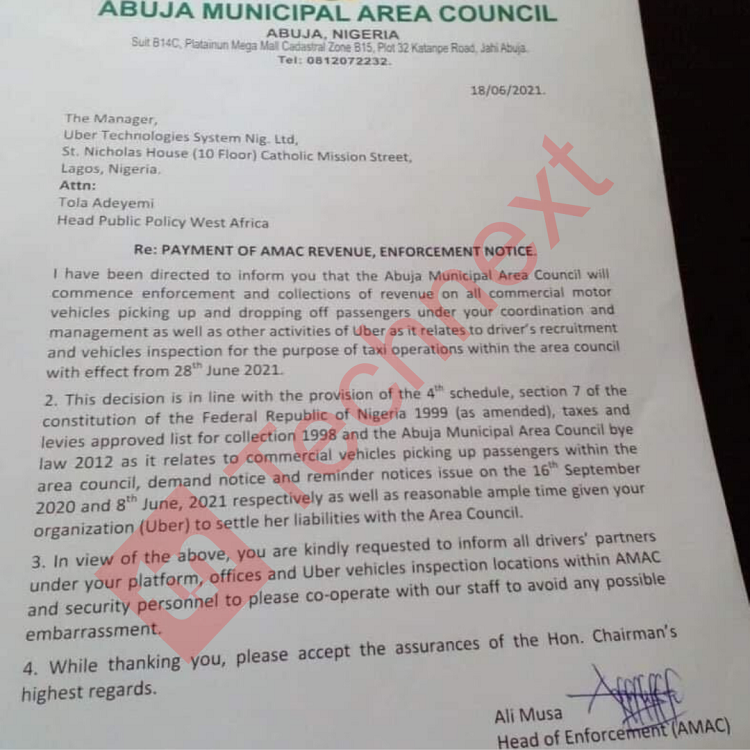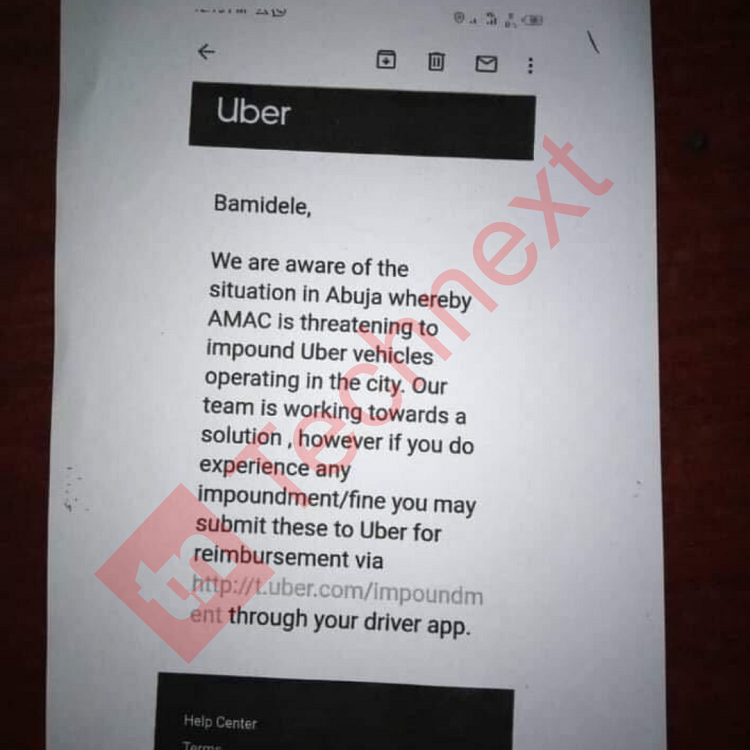Innovation always precedes regulation everywhere in the world. It is usually a matter of time before regulation eventually catches up. For taxi-hailing businesses in Abuja like Bolt and Uber, regulatory authorities are catching up with them really fast and it is taking a devastating toll.
Similar to Lagos, where officers of the Vehicle Inspection Service (VIS) hounded e-hailing drivers, in Abuja, it is the revenue task force officials of the Municipal Area Council (AMAC) that are clamping down hard on the drivers. Their methods are exactly the same: the officers book a ride to lure a driver before arresting him and making him pay a fine.
Incidentally, the drivers themselves used the same strategy to identify and harass fellow drivers who refused to adhere to a week-long boycott of Uber and Bolt apps in Lagos earlier this year.
But while the Lagos clampdown was essentially a ploy whose end game appeared to be getting the e-hailing companies to the regulatory table, so far, the Abuja situation has been to subject the companies (or their drivers) to pay a tax. In essence, the AMAC doesn’t seem interested in formally regulating Uber and Bolt beyond getting them to pay taxes.
But pretty much like the Lagos situation, the drivers have been made to bear the brunt.
How it began: the surrounding story
Both Uber and Bolt have been operating in Abuja for more than two years. In all that time, pretty much like Lagos, the ride-hailing companies had enjoyed a free rein, operating pretty much without any hindrances and no obligations. But all that changed this year.
With the increasing popularity of e-hailing as a safer and more dignified means of public transportation in the city, and with more and more drivers onboarding the apps, the Abuja Municipal Area Council decided the industry has grown big enough to start contributing to the municipality’s revenues.
According to findings, the council has informed Uber and Bolt about paying taxes as far back as 2019. But it didn’t really start enforcing the demand until June 2021.
It is unclear if the council sent an enforcement notice to the drivers before coming down hard on them or if it has started its clampdown before making it official with the notice. What we can confirm is that on June 18, the AMAC sent an enforcement notice to Uber and requested them to get their drivers to cooperate to avoid embarrassment.


With that notice, the council began going after Uber drivers. The clampdown forced the drivers, through the National Union of Professional App-based Transport Workers (NUPA-BTW), to respond to AMAC on June 24.
In the letter obtained by Technext, the chairman of NUPA-BTW and Director of the International Alliance of App-based Transport Workers (IAATW), Comrade Ibrahim Ayoade said that the attempt by the council to tax drivers amounts to double taxation as they already pay 25% commission to the e-hailing companies which included tax.
“Demanding payment from drivers directly as stated in your notice amounts to double taxation because as an app-based company, the 25% deducted from drivers which you are aware of, is inclusive of the tax you are currently demanding from the drivers.”
Letter from NUPA-BTW to AMAC
The drivers also cautioned the council on the methods employed by its operatives, insisting that the methods are akin to those employed by miscreants and as such could endanger the lives of the drivers.
Big tech, bigger responsibility
Technology was never meant to exist in a vacuum. No matter how erratic or arbitrary any technology is, because it was meant for people, it is just a matter of time before governments figure out a way to bring it under regulatory control.
And this way could be pretty mild like the regulation of the digital investment space by the Securities and Exchange Commission (SEC), or devastating like Lagos shutting down the bike-hailing space. Many tech players have advocated the need for innovators to make sure there are regulations on the ground before going fully into any space.
When we came into this space there was no bus-hailing regulation in place. We had to make them put a regulation around that. We have been able to align with the state government as regards a mass transit plan for the long term. They are also coming up with a reform system to also key into a technology (payment) system where people can either tap and go, book buses from an app. This is already what we do so where the government is going in the future is where we are right now.
Johnny Enagwolor, Co-Founder and MD of Plentywaka
It is therefore heartbreaking to see the Lagos situation of last year playing out in Abuja this year. It just seems some big tech players lack the drive to take on the big responsibilities. And in this case, the drivers claim Uber actually asked the Abuja Municipal Council, as far back as 2019, to demand payment directly from them (drivers).
See also: Uber and Bolt lose about ₦100m revenue as nearly 10,000 drivers complied with boycott order
Drivers refusal and Uber’s compromise
But the drivers’ body is sticking to its guns and blaming this one entirely on the ride-hailing companies.


In a letter to Uber General Manager for West Africa, Lola Kassim, the drivers asserted that the unfortunate situation has befallen them due to the company’s “refusal or inability to settle issues of revenue with AMAC.”
“We maintain our position that (the responsibility of) payment of revenue to AMAC is squarely that of your organisation in view of the fact that you deduct 25% from each trip made by drivers. We, therefore, demand a speedy resolution of the feud between Uber and AMAC so that app-based drivers can go back to driving without fear of harassment by the revenue task force,” the letter reads in part.
Uber has also responded to drivers on its Abuja platform, assuring them that its team is working to ensure a speedy resolution. In the meantime, if they are impounded or fined, Uber says it is willing to reimburse them.
It is unclear if any driver has been successfully reimbursed. It is also unclear what Bolt is doing to aid its drivers in Abuja.
The Abuja Municipal Area Council doesn’t seem interested in any formal regulation as was the Lagos case. So far, it is purely a revenue drive and the council is making that abundantly clear. But that does not mean regulation is out of its purview.
As more Abuja residents continue to choose ride-hailing, eventually some form of regulation might have to come in for the benefit of all involved.






